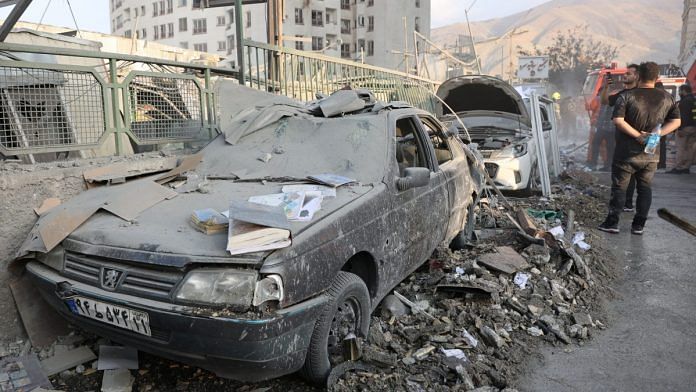Just two days before Israel’s large-scale attack on Iran, the domestic news was around the ever-growing internal divisions between religious and secular populations of the country, the annual pride parades in Jerusalem and Tel Aviv, depleting human resources for the continuation of the Gaza war, and how long the ultra-Orthodox Jews would evade compulsory military service. Also, people of the were debating whether to protest at the venue of Netanyahu’s son’s upcoming lavish wedding this week or not.
The issue of the ultra-Orthodox not serving in the army could have cost Netanyahu his government up until two days ago. They had threatened to bring down his government over a draft law which requires their young ones to report for mandatory military service or face legal punishment. Till late Thursday night, voting was underway in Israel’s parliament to dissolve the Knesset. Netanyahu barely avoided the fall of his government by extending some more concessions to the religious factions. While all of this happened, under-trial Netanyahu had to stand in the dock facing accusations of bribery, fraud, and breach of trust at a court in Tel Aviv.
The Friday attack on Iran’s nuclear programme, in which some residential buildings in Tehran were also hit, came as a complete surprise for the Israelis as much as for the rest of the world. There seems to be a long-term strategic plan behind such a move, and US President Donald Trump was party to it. After the attacks, he said he knew about the strikes and that “”. The president also stated that he gave a 60-day ultimatum to Iran to “make a deal” and that “they should have done it”.
The negotiations between Iran and the US were developing seriously as they held five rounds of nuclear talks, with the sixth one scheduled for Sunday. And Trump, numerous times, said he didn’t want more death and destruction after Gaza, and would rather work with diplomacy with Iran. In fact, he discouraged Netanyahu from on Iran two weeks ago.
With strong terms, requiring Iran to dismantle its nuclear programme and agree to inspections of its facilities, Trump thought he could reach a deal with Iran. We will only know in a few days what changed his mind about this strategy or how Netanyahu could prevail over the man who says he . It certainly seems a strategic victory for Netanyahu, who, since the 1990s, has been advocating a military response to Iran’s nuclear ambitions.
It is a dangerous event for the region as it can engulf many, though the US and other major powers like France and Germany have reaffirmed Israel’s right to defend itself. If regional states like Saudi Arabia, Jordan, and the UAE also join hands with their Western allies in helping Israel defend itself, it will be a turning point for the region. They did so recently when Iran launched about 180 ballistic missiles at Israel in October 2024. These countries do have a perception of fear and would prefer a weaker, non-nuclear Iran. Better for them if the Shia regime fails, but that is a cherished wish less likely to come through soon.
Where would Israel find itself after this “”, as many Israeli leaders are congratulating themselves? Is it another 1967 War that changed the military fortunes of Israel in the region? Given the iron-clad security guarantees and military aid from the US and other allies, Israel is likely to win this battle against Iran. Israel might have acted unilaterally, but it is not alone when it comes to its existential needs. It will have to go through an anxious phase for weeks and maybe months, but Iran would not be able to threaten Israel’s fundamentals.
The theocratic ‘republic’ has been facing domestic challenges for a long time in recent years, and regime fall is a chance in an overwhelming war with Israel and the U.S. After losing Hezbollah in Lebanon and its outreach in Syria, Iran is still grappling with the loss of proxies. Russia is not in a position to arm Iran much either. Putin is already exposed and is not so liked by Trump anymore since his refusal to allow Trump to broker a deal with Ukraine. He would not like to go against Trump now in an all-out war.
Israel, with Netanyahu’s brinkmanship, might not find itself in a better security position even if Iran remains a non-nuclear state for another decade. That’s the paradox. Since 1967, Israel has been dominating the region militarily, but that has hardly secured Israelis, as it was shown in October 2023. Israel’s Achilles heel is its war with Hamas and the whole business of conflict management through occupation. Countless military victories and pre-emptive strikes in the past have not helped Israel’s security or normalisation with the region. Political solutions to the conflicts are messy and may demand painful compromises, but they truly serve the cause of national security.
(Edited by Aamaan Alam Khan)








